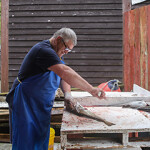Elizabeth Warren details "Blue New Deal" platform

Democratic presidential candidate Elizabeth Warren unveiled her “Blue New Deal” on Tuesday, 10 December, outlining her plans to protect the oceans and build up the fishing industry in the United States.
The idea, Warren said in a statement on her campaign website, came after hearing from an oyster farmer at a televised town hall appearance. It’s currently a critical time for the oceans as the water is becoming warmer and more acidic, while runoff pollution from farms and discarded plastic is also creating dead zones in oceans and the Gulf of Mexico, according to the Warren campaign.
One of the ways Warren wants to reduce pollution is by promoting regenerative ocean farming, which she said can provide several benefits.
“Algae and seaweed are the trees of our oceans, absorbing carbon and helping to reduce ocean acidification and pollution locally, and are valuable sources of nutrition,” said Warren, who currently serves as a Democratic U.S. Senator representing Massachusetts. “We must cultivate them just as we would any forest or above-ground ecosystem that naturally absorbs carbon dioxide. These resources even have the potential to become a key ingredient in renewable fuels – in the future, we might power our cars and airplanes on the algae grown in our seas.”
A plan to rebuilt fisheries is also included in her “Blue New Deal” platform. She’s calling on NOAA Fisheries to issue regulations to help fishermen and businesses adjust to the changing climate, and work to restore fish stocks, which could lead to as many as 500,000 new jobs and USD 31 billion (EUR 27.9 billion) in new sales. Warren also wants to see more processing plants built in the U.S., as more than 25 percent of the fish caught in U.S. waters are sent to Asian countries for processing before coming back to American markets.
“By building processing plants in the U.S., we can not only decrease the carbon footprint of the seafood industry, but we can also create a new class of jobs in the blue economy,” she said. “That’s why I have committed to spending USD 5 billion [EUR 4.5 billion] over 10 years to expand USDA’s Local Agriculture Market Program, funding food hubs, distribution centers, and points-of-sale.”
Also included in Warren’s plan is a call to streamline the permitting process for offshore wind and wave energy projects. Over the next decade, offshore wind could generate more than 36,000 jobs in New England and Mid-Atlantic states, she said. Warren criticized the Trump administration for blocking many of the wind projects from moving forward, while opening the oceans for more offshore drilling.
However, the Responsible Offshore Development Alliance, a fishing trade group that seeks to build relationships with offshore wind developers to ensure both industries can co-exist, said in a statement responding to Warren’s plan that fast-tracking permits flies in the face of cautious planning and review processes.
“RODA supports the creation and maintenance of American jobs and a robust domestic workforce, and that includes citizens already engaged in maritime industries,” RODA Executive Director Anne Hawkins said in the statement. “The interactions between resource-based activities, fishery stocks, protected species, ocean ecosystems, and the climate are extremely complex and not well-translated into sound bites. In order to fully protect our ocean and the people who rely on it, new ocean uses – from offshore energy to aquaculture to protected area – must be pursued in a manner that prioritizes and fully funds science and research to maximally benefit the nation.”
Photo courtesy of Jeffrey Alan Photography





Share